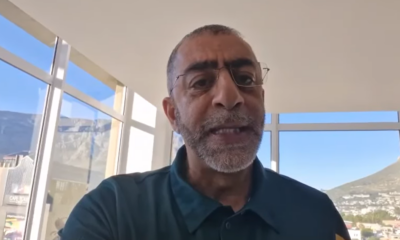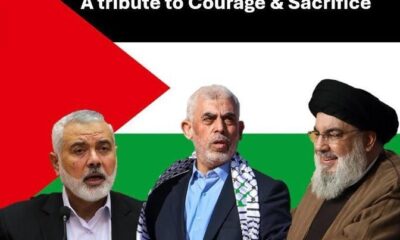
Israel

Ceasefire now or later – that’s the impossible question
With Hamas’s recent killing of six hostages leading to a surge in demand within Israel for the government to agree to a ceasefire immediately, it’s important to analyse the pros and cons of this decision. As it stands, two issues cloud the debate.
First, the issue of the hostages, which of course is deeply emotional. This has been magnified by the harrowing accounts of the terrible abuse and mistreatment the hostages are being subjected to as well as pictures starting to emerge of the truly horrific conditions they are being kept in.
Second, there’s no doubt that Prime Minister Benjamin Netanyahu has lost much credibility, abroad and at home. Although his polling figures have picked up, there’s still a majority of Israelis that want him to go.
Many see him as prolonging the war for his own political benefit. This may or may not be true, but even if it is, it still doesn’t mean that Israel should immediately end the war because there are many reasons for Israel to be wary of an immediate ceasefire.
On the positive side, the benefits of a ceasefire are clear. The most obvious being that some of the hostages will be released. Although, it must be stressed, the details of the release haven’t been made public. It’s not clear over what period the hostages will be released, and if the release would include any soldiers, or only women, children, and the elderly and sick. However, obviously getting hostages released is a priority for any Israeli leader, and Israel has always prided itself on not leaving any of its people behind.
Then, we need to recognise that a ceasefire gives the troops a well-deserved rest. Many of them have been fighting for eight or nine months, and cannot continue forever. In addition, they will need to freshen up and regroup for any potential escalation in the north.
We also need to consider that Israel is finding itself increasingly isolated on the international stage, borne out recently by the news that the United Kingdom, previously a close ally, confirmed that it would be suspending 30 out of 350 arms-export licences to Israel. This affects equipment such as parts for fighter jets, helicopters, and drones. An end to the war now would definitely assist Israel’s position internationally.
Finally, Israel’s relationship with the United States, its main ally, is becoming increasingly frayed, with the administration pushing hard to end the war before the election in November. This relationship will very likely become more difficult if Kamala Harris wins, as she has made it clear repeatedly that she wants an immediate end to the war.
However, the disadvantages of an immediate ceasefire are also clear.
First, there has been no clarity about which internees in Israel Hamas wants released in exchange for the hostages. It may well be that some of the names on Hamas’s list are unacceptable to Israel as they could create major security risks. This issue in itself could make any deal a non-starter, as it must never be forgotten that Yahya Sinwar, the architect of the 7 October attacks, was released in the previous prisoner/hostage swop.
Second, Israel is concerned that if the war ends now, Hamas will claim victory as it will have survived. This will be magnified if Israel is unable to capture Sinwar, Hamas’s leader, before any ceasefire. If he comes out of the tunnels after a ceasefire a free man, he will undisputedly be the leader of the Palestinian movement and a hero to the Palestinians. That will very likely lead to the Palestinian Authority in the West Bank collapsing, with Hamas taking over its reins and becoming the controlling power in the West Bank. That would, in turn, lead to an upsurge in violence there – this has already begun – with a major security risk for Israel, which will have to contend with a Hamas threat on two fronts. It’s unlikely that Israel would be prepared to risk this scenario.
Many in the security establishment do seem to want to accept a ceasefire deal, but the conditions they are happy to accept also haven’t been made clear. Their conditions are probably still too far apart from Hamas’s. For example, it’s unlikely that they will accept continuing Hamas control of Gaza in any form.
They also don’t seem to share Netanyahu’s assessment that continuing Israeli control of the Philadelphi Corridor is so crucial. Their analysis has been supported in media like The Jerusalem Post and The Economist, but the Philadelphi Corridor is only one of the issues, and not the most important one.
While on the one hand, the war must end and probably cannot carry on much longer, on the other, it seems clear to many that Israel cannot simply end the war now without having achieved some of its key aims. In addition, while the condition of the hostages remains dire and time isn’t on their side, Israel cannot afford to be seen by its enemies to have lost this war.
The decision when to end this war and under what conditions is devilishly difficult. Even a leader with more credibility and support than Netanyahu wouldn’t find the decision easy. This is a fateful decision to make either way, and not one that any leader would relish having to take.
- Harry Joffe is a Johannesburg tax and trust attorney.











Robert Mancusso
September 24, 2024 at 5:46 pm
‘The United Kingdom, previously a close ally, confirmed that it would be suspending 30 out of 350 arms-export licences to Israel. This affects equipment such as parts for fighter jets, helicopters, and drones. An end to the war now would definitely assist Israel’s position internationally.’
What good is it if Israel simply ends the war to please the UK, US and others, if it means that Israel will only get back a couple of hostages, but will have lost deterrence and will have to fight Hamas again further down the line, possibly under more difficult and dangerous circumstances.
Israel needs to finish off Hamas in as much as that is possible so that they cannot gradually rebuild themselves with the funds that will flow into Gaza as soon as the war stops. Any funds going to UNRWA is going to ultimately go to Hamas.
Israel needs to also internalise that it’s so called allies, the US and UK are basically ”fair weather friends” who are only happy to support Israel if it suits them and that isn’t something that Israel can allow to dictate when and how it defends itself. Israel needs to produce as many of it’s own weapons as possible so that it cannot be held to ransom by either the US or UK in future wars. Israel needs to rely on itself to protect itself and it cannot outsource that to anyone else. Words of support by the US and others mean very little when it is Israeli lives that are on the line.
This is not a political issue, but a religious issue, this war with Hamas, Hezbollah and Iran and Co. is a religious war, it’s a case of Judaism vs Islam, and Islam is inherently antisemitic. This simple fact is either unknown to many or is simply ignored due to political correctness.